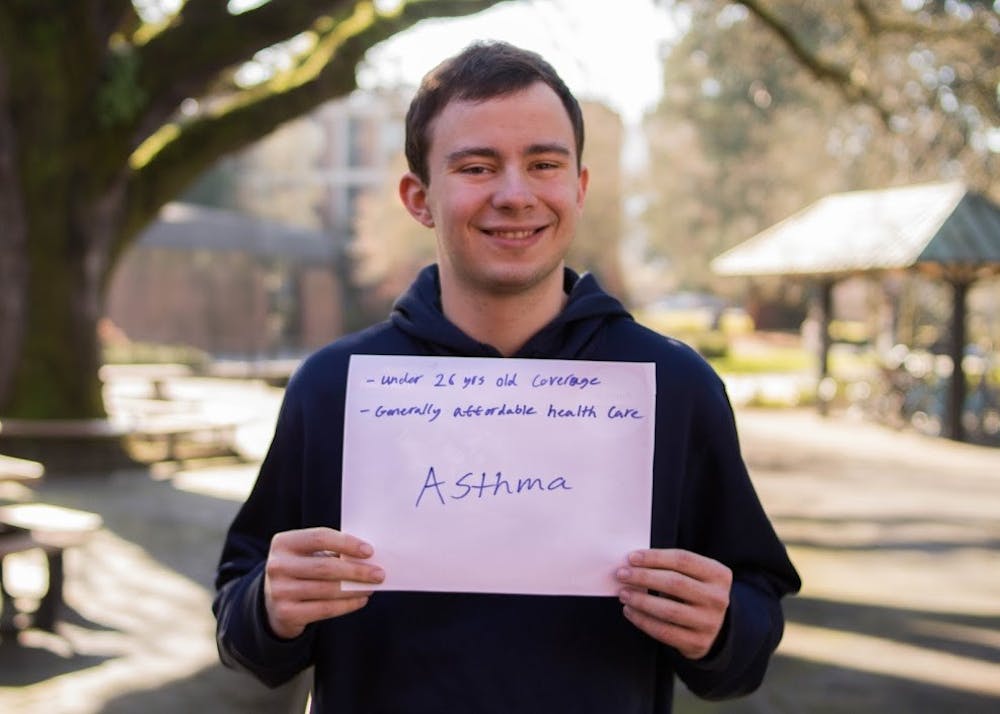Senior Collin Haahr doesn’t know how he will afford health insurance after he graduates. But if the GOP decides to repeal and replace the Affordable Care Act completely, he’ll likely go uninsured after he graduates from the University of Portland in May with his communication studies degree.
One of Donald Trump’s biggest campaign promises was to repeal the Affordable Care Act, a program to expand healthcare access and affordability introduced by then-President Barack Obama in 2010.
Keeping his word, President Trump took the first steps toward rolling back the ACA on his first day in office nearly a week ago, signing an executive order to “minimize the unwarranted economic and regulatory burdens of the [Affordable Care] Act.”
The Affordable Care Act — or, Obamacare, as some call it — has made health insurance available for over 20 million Americans who could not afford it before. And according to theDepartment of Health and Human Services, 6.1 million young adults ages 19 to 25 have gained health insurance due to the provision of the ACA that allows them to benefit from their parents’ insurance plan until they are 26.
Though Donald Trump and other Republican leaders claim they want to keep the under-26 provision when they replace the ACA, it’s not clear yet what the new president will introduce to replace it and how those changes will affect students and recent graduates.
Not knowing what will happen makes students like Haahr anxious for their futures and the futures of others. He’s currently covered by his mother’s insurance plan, but if the under-26 provision of the ACA goes away, he’ll be on his own for health care.
“When I graduate, I’m going to have to think about it and I’m going to need to have the cash to buy health care, and I’ll probably not have it for a long time,” said Haahr. “And there are going to be a lot of families that can’t afford basic services. There is a very surprising lack of empathy right now that I just think is crazy.”
Growing up, Karina Agbisit, who graduated in December 2016 from UP, never felt comfortable with going to the doctor or getting medical attention.
“Even though we had [health insurance], the culture of my family was very much not to use it,” Agbisit said. “I think it stemmed partially from a distrust in medicine and how we managed our money growing up. Nothing was allotted toward medical expenses unless it was a dire emergency.”
Agbisit signed up for the Oregon Health Plan, the state’s medicaid (Affordable Care Act) program, in September. During her first doctor’s visit while covered by the Oregon Health Plan, she couldn’t believe that she didn’t have to pay a dime for the appointment.
If the ACA is repealed, Agbisit’s major fear is losing access to birth control. She’s tried long-term birth control before, such as the implant, but ultimately switched to the birth control pill, which is not a long-term option. This means she must purchase birth control at least once per year.
She’s gone to Planned Parenthood for her birth control pills, but worries about how she’ll get her supply if Planned Parenthood is ultimately defunded.
“My year’s supply of contraception is going to run out and I have no idea what that is going to cost without health insurance,” she said. “I can barely afford rent.”
Clayton Stahnke signed up for health insurance from the ACA shortly after he graduated from UP last May with a degree in civil engineering. Because being on his mother’s plan would have been expensive, Stahnke found a cheaper solution through ObamaCare’s Health Insurance Marketplace, a service that helps people find and enroll in “affordable” health insurance plans.
While Stahnke’s insurance rates have lowered considerably thanks to the ACA, at one point as low as $100 per month, he says the whole program definitely needs to be reformed in order to make it more efficient and less complicated.
Stahnke said going through the Marketplace was frustrating because all of his friends were still on their parents’ plans, so he did not have much guidance on how to go through the process.
“One thing that I realized is that going through the marketplace is very complicated,” Stahnke said. “It’s like filling out taxes. There’s no smooth way.”
Stahnke believes that Obamacare is “in shambles” and needs to be reformed. Communication between the federal Marketplace and his health insurance provider is one thing he says has been frustrating. But he’s not too hopeful that the new administration will make things any better.
Though Stahnke describes himself as being fairly healthy and therefore says he is willing to take the risk not paying for health care, others who are not as fortunate in their health and women who have to pay for regular reproductive care will have a harder time depending on the revisions Trump makes to the system.
“I’m very pessimistic about what [Donald Trump] is going to do,” Stahnke said. “The whole mission statement of the Republican party in terms of health care is leaving it to the free market... I could easily get health insurance because I haven’t had a heart attack or I don’t have cancer, but millions of people won’t be able to get health insurance, and I don’t think Donald Trump has any idea of some sort of compromise that’s going to work.”
To this end, the repeal process for Obamacare has begun but there is no replacement plan on the table yet. Because it is a such a big federal law, it would require another federal law to repeal it, which would require an act of Congress, not just an executive order from the President.
For now, it is still possible to enroll in Obamacare health plans for 2017.
But Stahnke isn’t hopeful that the Marketplace will be a great system in the coming year with the new administration making changes.
“Going through the federal Marketplace, especially now that everything’s been handed over – I have no faith in that system anymore,” he said. “It’s just a little scary.”








